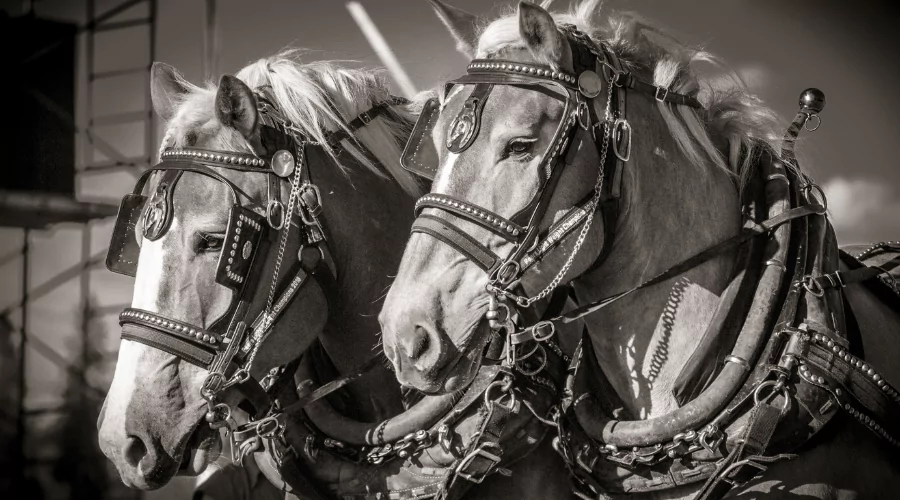From the gently rolling terrain of the Black Forest to the busy streets of Berlin, Germany’s rich equestrian legacy reflects the long history and exquisite beauty of its native horse breeds. These powerful equines symbolize the country’s cultural history and the famous landscapes of their homelands. This guide will take us on a journey through the many German horse breeds, each of which is a one-of-a-kind masterpiece suited to specific uses and characteristics.
German Equestrian Legacy
Germany’s dominance in the equestrian world is unquestionable. Centuries of careful breeding and respect for the equine mentality have resulted in breeds that represent characteristics sought after by horse fans throughout the globe. The bond between horses and humans is firmly embedded in German culture, with horses playing an essential part in agriculture, transportation, and even the national spirit.
The country’s dedication to breeding and horsemanship extends back to the days of chivalry when medieval knights influenced the creation of solid warhorses. Fast forward to today, and German equestrian disciplines and technology are renowned worldwide.
Now it’s time to focus on the stars of the German stable: German breed horses, who are known for their adaptability, intelligence, and stunning physical characteristics.
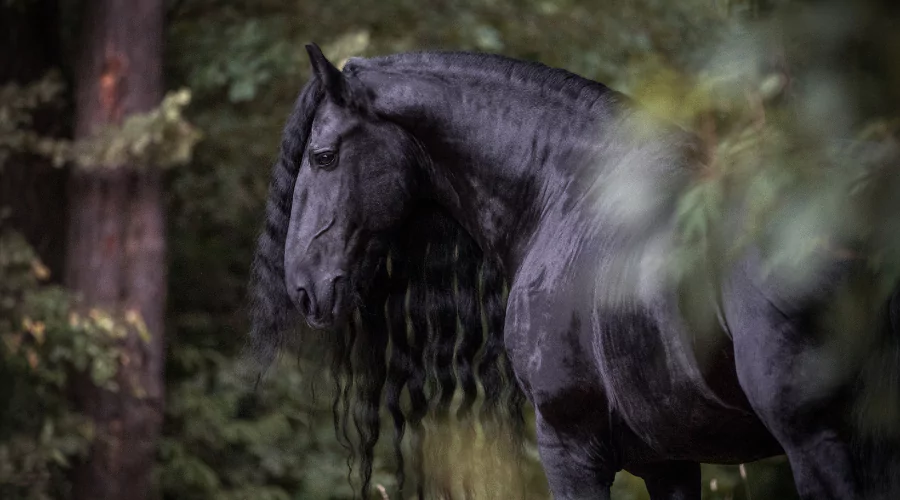
The Black Forest Horse:
Nestled in the peaceful environment of the Black Forest, the Black Forest Horse, also known as the Schwarzwälder Fuchs, is a picture of beauty. This unusual breed is called for its home location in Baden-Württemberg, where lush woods and rich meadows have sculpted its sturdy build. With a dense chestnut coat and flaxen mane, this attractive breed is a joy to see and an effective laborer often utilized in forestry and farming.
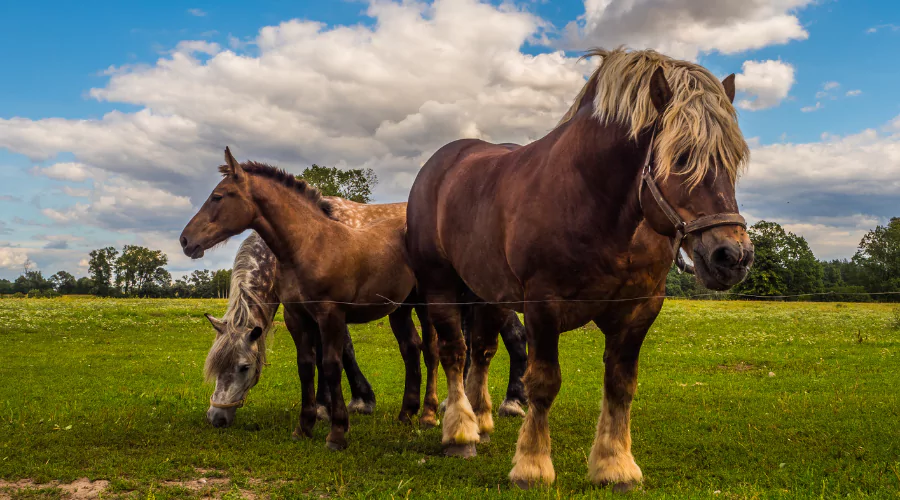
The Greatness of the German Draft Horse:
The German Draft Horse, or Kaltblut, is often the unsung hero of hard work, known for its force and endurance. This category includes multiple diverse breeds, each suited to a particular activity. Whether it’s the Brandenburger, Röwer, or Cold-Theissow, these massive equines are known for their mild disposition and unwavering work ethic, making them famous for pulling carts, plows, and even in the current logging business with phenomenal ease.
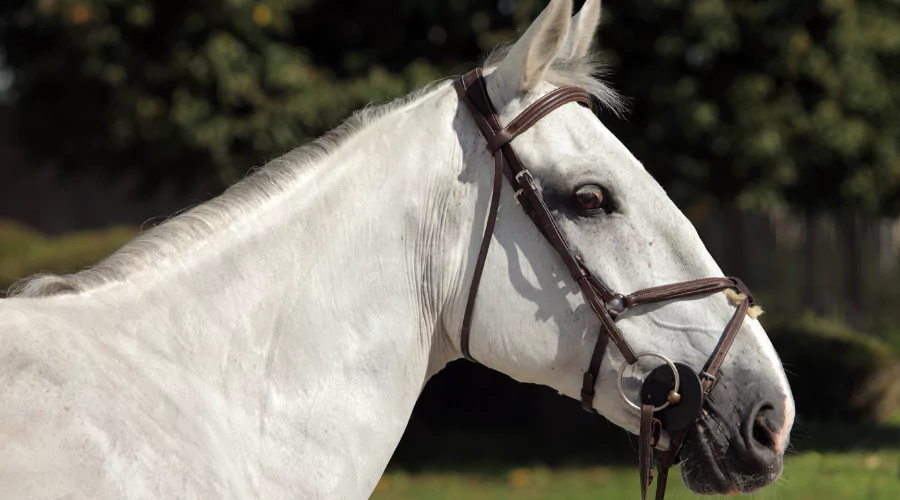
The Mighty Hanoverian:
The Hanoverian is a real aristocrat in the world of equestrian sports, renowned for its athleticism and exceptional movement. The breed’s exact roots are a story of equestrian ambition and strategic breeding, which resulted in a horse recognized for its brilliance in showjumping, dressage, and eventing at the highest levels of competition. This attractive breed is immediately identified by its noble head, robust build, and vibrant personality.
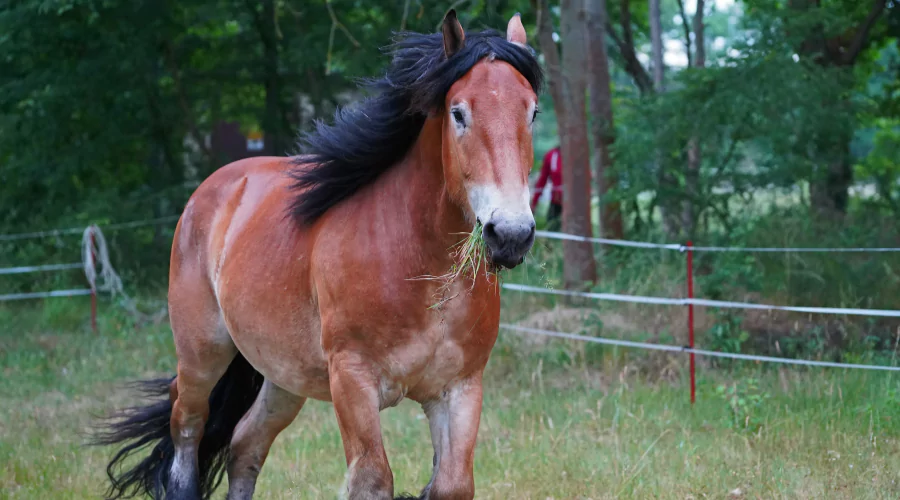
The Resilient Rhenish-German Cold-Blood:
The Rhenish-German Cold-Blooded is a gentle giant from the Rhine River area. The Rhenish-German, frequently chestnut in color and has a flaxen mane and tail, excels in pulling power, drawing carriages with elegance and strength that belies its stature. Whether in parades, festivals, or as a leisurely pleasure horse, the Rhenish-German is an essential aspect of German rural life.
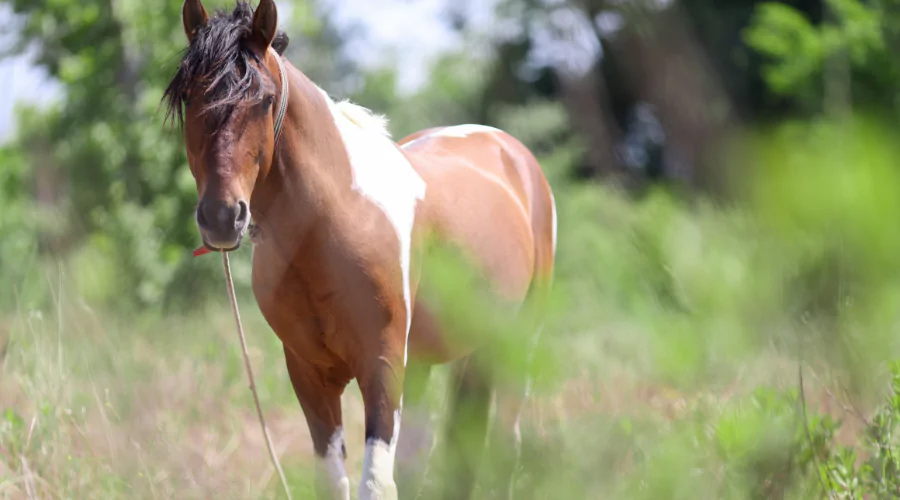
The Intelligent Trakehner: A Noble’s Companion
A refined breed with a reputation for intelligence and adaptability, the Trakehner originated at the old Trakehnen stud in East Prussia. The Trakehner’s graceful build and lively temperament have made it a stunning addition to competitive sports, especially dressage, from its original use in light cavalry. Aside from being a trustworthy friend, this graceful breed is a favorite among those who like pleasure horse riding.
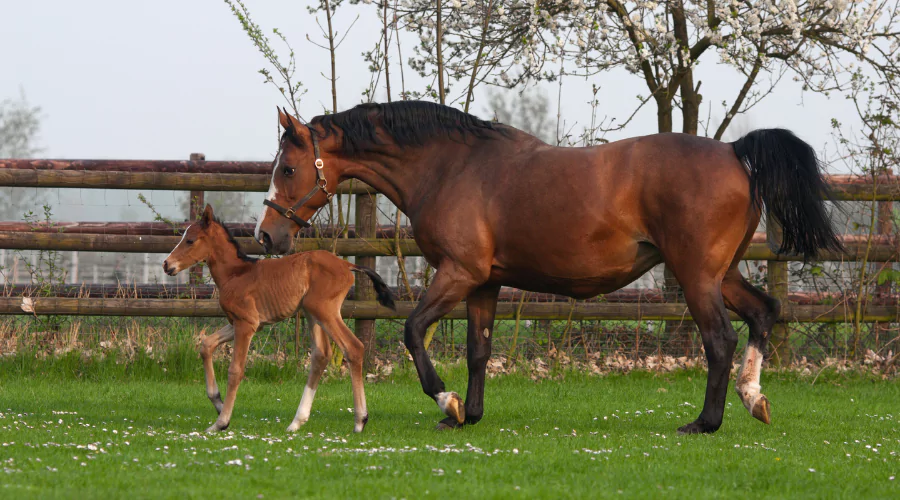
The Elegant Westphalian: A Breed Born of War
The Westphalian is an offspring of bloodshed and the will to survive and thrive in hardship. Though it originates as a carriage horse, this breed’s highly regarded traits have made it a global powerhouse in dressage and driving. The Westphalian is an exceptional athlete; he has a balanced build, great speed, and an eagerness to please.
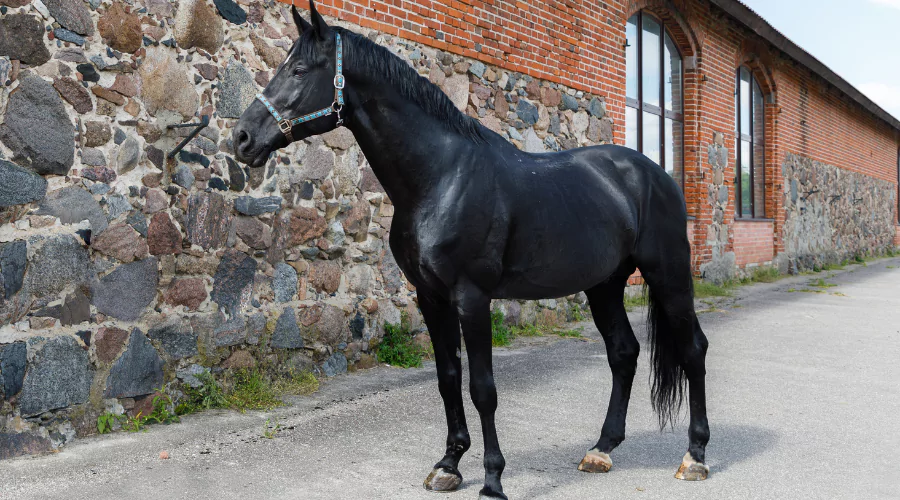
The Spirited Holsteiner:
As a symbol of the marine province of Schleswig-Holstein, the Holsteiner is endowed with a magnificent look and an unyielding personality. This breed is well-known for its sturdy build and impressive jumping ability. Its exceptional agility and sturdy legs make it a formidable competitor in show-jumping events all over the globe. With a beautiful head, medium frame, and a loving demeanor, the Holsteiner is a favored breed for pleasure riding as well.
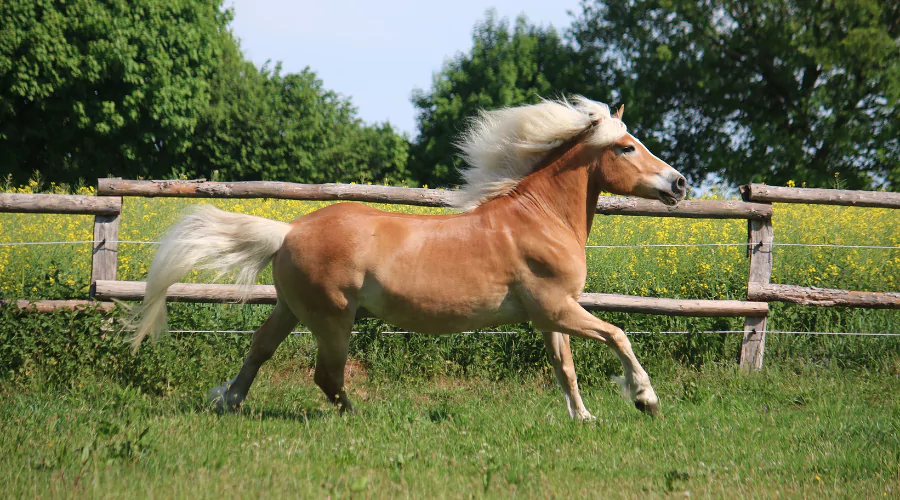
The Curious Suabian Haflinger:
The Suabian Haflinger, with its flaxen mane and chestnut coat, is the product of sophisticated breeding procedures practiced by the Suabian farmers. Known for their gentle attitude and flexibility, these horses are famous for both light draught labor and as family riding horses, pleasing children and adults alike with their good-natured personalities. Although not as visually imposing as its draft horse rivals, the Suabian Haflinger makes up for it with its intellect and strong work ethic.
Conclusion:
The German horse breeds stand as an emblem of the nation’s cultural fabric; each breed is a thread contributing to the rich, diversified essence of German equestrianism. Beyond their visual appeal comes a greater importance, a living witness to the human-equine link and the skill of selective breeding.
For the devotee wishing to experience the incomparable connection between horse and rider or the lover of equine grandeur longing to peek into Germany’s legendary past, these breeds provide a portal to a world where history, utility, and beauty merge.
FAQs:
What is the oldest horse breed from Germany?
One of the oldest horse breeds from Germany is the Alt-Oldenburger, originating from the 17th century. Originating in Lower Saxony, this breed created several current warmbloods, notably the Oldenburg. While not as prevalent now, the Alt-Oldenburger remains vital to Germany’s horse history.
Are German horse breeds suitable for every rider?
The variety of German horse breeds means there’s a fit for practically every rider. Some, like the Hanoverian and Holsteiner, thrive in expert riding and competitive pursuits, while others, like the Haflinger, make trustworthy companions for novices and youngsters. The goal is to combine the horse’s temperament and horse training with the rider’s abilities and objectives.
What kind of care do German horses typically require?
Maintaining German horses demands a continuous regimen that includes a balanced diet, frequent exercise, and preventative health treatments. Their huge height may occasionally require particular food regimens or health measures, which should be maintained under the advice of equestrian experts.
Can German horse breeds adapt to different climates?
Several German horse breeds are noted for their resilience and ability to adapt to varied conditions. For instance, the Hanoverian and Holsteiner have flourished in the colder European temperatures and the hottest portions of the United States and Australia. Proper care and acclimation are vital to guaranteeing any horse breed’s health and comfort in a new location.
What should I consider when choosing a German horse breed for dressage?
When choosing a German horse breed for dressage, examine the horse’s conformation, movement, and temperament. Breeds like the Hanoverian and Trakehner are highly acclaimed for their balance, grace, and athletic ability, making them perfect for the accuracy and elegance of dressage. This demanding discipline suits a horse with a calm, alert disposition and the capacity to learn and execute complicated moves.
Are there any unique challenges in raising and training German horse breeds?
As with every breed, growing and training German horse breeds have particular problems. They frequently demand persistent and expert training, particularly those breeds that succeed in high-level competition. Additionally, maintaining ideal health and condition might be tough considering their stature and the possibility of hereditary health concerns. Working with a vet and a skilled trainer who knows the unique demands of the breed may assist in overcoming these issues.
What are the costs associated with owning a German horse breed?
The expenses of owning a German horse breed may vary significantly and include the initial purchase price, which can be expensive, particularly for horses with a proven show record or breeding potential. Ongoing expenditures include boarding, feed, regular veterinarian care, farrier services, training, and equipment. Insurance and unexpected medical treatment might contribute to the expense as well. Potential owners should adequately investigate and budget for these fees before committing to horse ownership.
You May Also Like:
5 Small Horse Breeds: Little Horses, Big Charm
A Guide to Racing Horse Breeds
8 Powerful Draft Horse Breeds: Titans of Labor
The Beauty Black Horse Breeds
10 Beautiful Russian Horse Breeds
